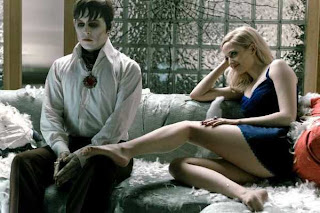 |
| Aliens will sink your battleship in Battleship. |
* * Battleship.
Written by Eric & Jon Hoeber. Directed by Peter Berg.
Americans have always
been queasy about sex--except for the eroticism of weapons. An exposed female breast
is an object so potentially obscene we cover our children's eyes. The sleek,
curvaceous flanks of an F-22 Stealth fighter, however, present guilt-free
pleasure, up to and including the moment when it drops a bomb on a building.
Put a model in a bikini and you might have a post-worthy image for Facebook; give
that model a machine gun and you'll have thousands of YouTube hits, and even attract
the ironic attention of Quentin Tarantino.
Peter Berg's Battleship
is supposed to be based on that Baby Boomer-era board game, where players
insert little red pegs into grids. In fact, it's really just ordnance porn in
the hard body, hard rock tradition of Top
Gun. Berg (Hancock, Friday Night Lights) gives us a scenario
wherein the US Navy takes on a flotilla of alien ships hell-bent on annexing Hawaii.
Along the way we get the usual money shots: guns blazing, planes whooshing, and
a 16-inch shell from the battleship USS Missouri
popping from its long, hard turret. Pop singer Rihanna, as "Petty Officer
'Weps' Raikes," gets to handle the fire-control stick, as long as she
doesn't show anything of the body she deploys so effectively in her videos.
Scorning a movie as ridiculous as Battleship is easy. Admitting I was fairly entertained by it is
harder. Yet, strangely enough, I was. Credit screenwriters Eric and Jon Hoeber
for taking a little time to make a character out of hero Alex Hopper (Taylor Kitsch).
Hopper is the classic scamp, the bad-boy maverick who's also a stealth nerd who
can quote Homer. If his character seems familiar, he should: Kitsch plays basically
the same Captain Kirk character Chris Pine did in the J.J. Abrams Star Trek. The Hoebers even give us the
same scene from Abrams' film, where the young Hopper finds himself thrust into
command when the aliens kill all his superiors (Rihanna, of course, is his bad-ass
version of Uhura). No credit for guessing he becomes the kind of Kirkish leader
only Homer-reading mavericks can be.
There are also a few moments that show a certain ironic
intelligence at work. When Berg pumps up the rock 'n roll here, it's not for
the usual homoerotic volleyball scene, but for a bunch of veteran amputees
hitting their physical therapy routines. The aliens are more humanoid than the
damp, slavering bugs often seen in movie sci-fi, yet still plenty scary. The filmmakers
even find a non-absurd way to work the board game's grid-based guessing game
into the story ("H-3, miss!"). No spoilers on how. Suffice it to say
that the science of modern warfare, which is almost always fought "over
the horizon", can seem more like the board game than you'd think.
Though Battleship
isn't wholly terrible, its consequences might still be. Now that we’ve devolved
to the point where movies-based-on-comic-books are beginning to seem a touch too
cerebral, too old-school, we’re now in for a slew of features based on classic board
games. Movies of Ouija, Risk, an Adam Sandler Candyland, and (most intriguingly) a
Ridley Scott version of Monopoly are
in the works. The opening credits for Battleship
feature the Hasbro logo. Can the first Milton Bradley epic be far away?
© 2012 Nicholas Nicastro




